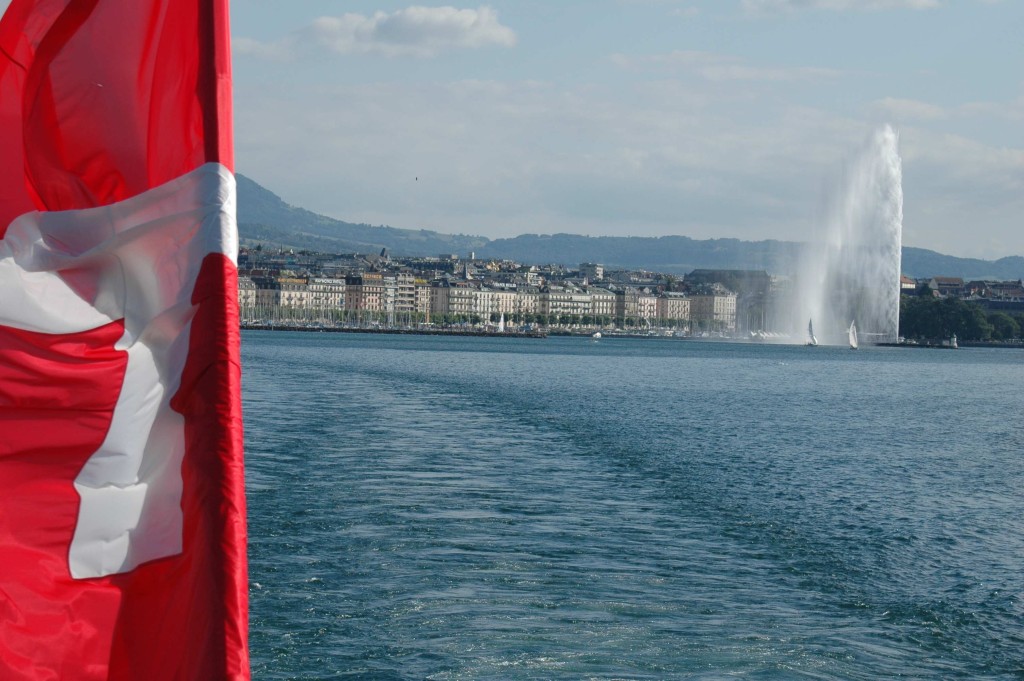
The February 9, 2014, referendum that garnered a “yes” to stop mass immigration into Switzerland and replace it with a system of quotas has sent ripples, even shock waves, throughout Europe. The initiative passed by a slim margin of 50.3% to 49.7%, with participation at just over 55% of eligible voters, and people in both camps are nursing hangovers these days, from different spirits, as it were.
The issue on the table was by no means new. Societies the world round are occasionally gripped by nativist impulses that target foreigners, and Switzerland is no exception. In the 1970s, one James (sic) Schwarzenbach launched an initiative against “over-foreignization,” turning what appeared to be a groundswell of backing from several Swiss cantons into a political party. But the initiative failed and the party ultimately fizzled.
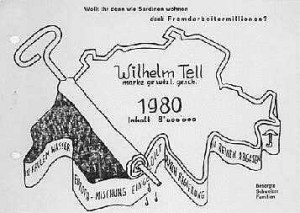
The current initiative was put to the Swiss people via the Swiss People’s Party (SVP/UDC), which is a lot more savvy than the late Schwarzenbach, and, of course, operating in a different era. It has produced a number of rhetorically noisy and cunning campaigns in the past already, mostly designed to elicit a knee-jerk reaction to anything foreign. One recalls the famous anti-minaret campaign of 2009, which drew the ire of the EU, or the “black sheep” campaign of 2010 to throw out foreigners who had committed felonies.
At first glance
Both earlier initiatives won, thanks in part to the ruckus raised by the posters whose communication boiled down to crude demagogery. Simple colors, simplistic icons, oafish but graspable message. And effective. In fact, the People’s Party’s “black sheep” poster even found use by the Neo-Nazi NPD party in the German state of Hessen, by Italy’s Neo-Fascist Lega Nord, and by some other extremists in the Czech Republic. The poster in Switzerland showed three white sheep kicking a black sheep off the Swiss flag, and it raised hackles all the way to the Un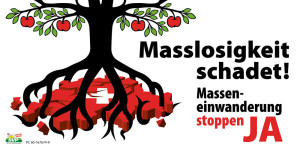 ited Nations.
ited Nations.
The present referendum’s artwork also grabbed the headlines but for other reasons: the apple tree whose roots are crushing Switzerland with an inscription proclaiming the damage of mass immigration was actually borrowed from Economiesuisse, the Swiss Business Federation, which opposed the initiative together with syndicates and other industrial associations. Its apple tree – used in campaigns since 2000, no less – was intended to show how relations and treaties with European Union were benefiting Switzerland (the apples). What this had to do with the concerns of the Swiss people about immigration was not immediately clear and either confued or alienated potential voters. “I was against the initiative,” said a friend of mine, who is very engaged in Switzerland’s political debates, “but I couldn’t vote for the Economiesuisse proposal, because they seemed to be supporting the kind of wage dumping that big business would like to have. But no one is taking the issue of immigration seriously and addressing it, and the SVP/UDC did.”
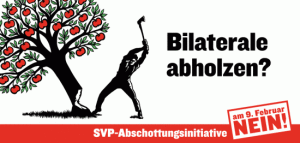
Battle lines
The People’s Party does choose its issues well. The topic is always a little taboo, hence it attracts lots of attention, which is the cardinal rule in breaking out of websmog. Their initiatives can usually be summed up in a single short phrase and they go to the gut or the jugular, or both, ideal for the 140-character society. And the Party’s strategists have a musician’s gift for timing, they know when to simply let their issues ferment and simmer. The Internet and papers do the rest, especially the comment sections of newspapers and blogs. This permits all kinds of nonsense to be uttered without the higher-ups catching any flak. Vague connections are made between immigration (or any other bugaboo) and the lack of affordable housing, the high price of real estate, the filled trains, traffic jams, failures in schools, crime, noise in the streets, dirt, crooked bankers, ugly architecture, and lost jobs, etc.
On the other hand, countering these gregarious views is inherently difficult and often requires moral, ethical and even legal arguments that most voters are hardly inclined to follow after a hard day’s work, what with all the mesmerizing entertainment provided by our daily screens.
And, finally, perhaps at the core of the issue, there is the subtext of unemployment, which is one of the main Swiss worries, especially, when it comes to immigration. Life here is expensive, and maintaining a high standard of living is not that easy. While the country’s own jobless rate is very low (averaging around 3.1%) and economic growth is high, what people actually perceive is different and they have the proof just beyond Switzerland’s borders.
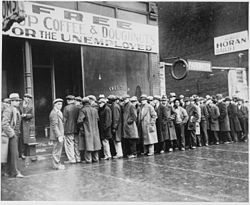
It’s no picnic out there, if we are to believe the media. Europe’s economy is sluggish, unemployment is over 10% for the whole EU, earnings are low (though social benefits excellent). It all seems very threatening, like some Fritz Lang movie of the 1920s. Foreign nationals are needy and greedy and pressing at Switzerland’s gold-strewn shores, or so it seems … And the ghastly conflict in Syria, the unrest in North Africa, the hordes in the East waiting to pounce, the Chinese plagiarists are all giant shadows performing some ghastly economic Totentanz in the background. The result is a fortress mentality, which is aggravated every time the United States IRS puts a gun to the head of the Swiss banking system, or the German or French tax authorities get a hold of a few CDs with the names and account numbers of German tax evaders.
So the immigration issue may well be getting mixed in the minds of many with the whole cluster of other insecurities and uncertainties that have become the electrifying juice of our capitalist system, the Damocles sword held over the Average Joe and Jane to keep them on the straight and narrow, no complaining, please, your job is next on the block. So what some Swiss voters are saying then is: leave us alone, we’ve done our bit, now you do yours and let us get along with our lives, things were better before. The fact that cities like Zurich, Geneva or Basel actually voted against the initiative suggests as much. Geneva! Which is literally overrun by foreigners of all stripe, but could not really survive without them.
After-maths
But vote they did, and now the chickens are fluttering and clucking near the roost. The Nays are disappointed and shocked that the measure, which seemed doomed to failure just a few weeks ago, actually passed. The Ayes, for their part, are gloating but with that slightly sour “I-told-you-so” attitude. Many of their comments in the papers, on television, and even in public, suggest that they did not quite understand the implications of their yes to the no immigration. Or worse yet, they don’t really care either way, since the point was to show the world that the Swiss system of direct democracy still works and that they will not let themselves be subjected to a “dictate” from Europe – a kind of political dog whistle often blown by the right wingers in the country, and one that is sure to garner votes.

Unfortunately, though, the laws in place are not that simple. The Swiss government can’t just text or tweet the EU Commissioner and break off the engagement. The CH-EU relationship is far more complex. In the run-up to the referendum already, the EU had been sounding the alarm about Swiss voters deciding to roll back the “free movement of people” across borders, a right written into the first set of Bilateral Agreements that went into force in 2002 and was extended to new EU members in 2005 and 2009 respectively. Negotiations on including Croatia in the Bilaterals (which joined the EU on July 1st, 2013) are now threatened, said Richard Jones, EU Ambassador to Switzerland , and with it a number of research and exchange programs, like Horizon2020 and the Erasmus+ program, which facilitates all sorts of professional and academic exchanges across EU borders. So opportunities for young, talented and ambitious Swiss individuals may have just taken a blow… if, as the Germans would say, the food is eaten as hot as it is cooked…
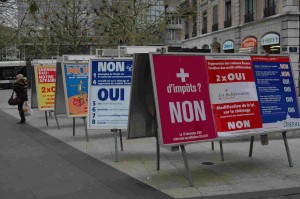
The European reaction to the vote was swift and categorical. French Foreign Minister Laurent Fabius and Swedish Foreign Minister Brigitta Ohlsson spoke of reconsidering EU-CH relations, Italian Foreign Minister Emma Bonino said she would put the issue on the table with the EU Council, and Jean Asselborn from Luxembourg warned EU countries of striking separate deals with Switzerland.
The Swiss are an important partner for the EU, said Viviane Reding a few weeks before the vote, “but the EU is also an important partner for Switzerland.”
Talk has been of invoking the “guillotine clause,” which would call into question all the benefits of the Bilateral Treaties that Switzerland managed to negotiate after saying no to membership in the European Economic Area in December 1992 – curiously by a majority of 50.3%. The consequences could be quite drastic in many different areas, including technology, agriculture, education, environment, security and cooperation, even road traffic. In short everything that made CH a virtual member of the EU without having to deal with some of the political shenanigans and without losing its sacred right to direct democracy.
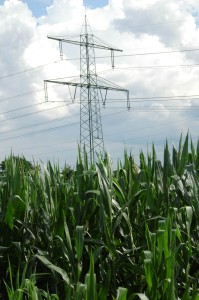
In an interview with the Tages Anzeiger, National Counsellor Christian Wasserfallen from the Free Democrats, a member of the Energy Commission, pointed out that the treaty on electrical power trading with Europe is in jeopardy, and the threat could extend to a variety of other industries, from the chemical – not news Basel wants to hear – to financial services. “Our companies have a lot of value creation in the balance,” he said, “but how the initiative will be implemented is still an open question.”
Theoretical victory
For its part, the populist right wing is in ecstasy. Their feeling was summed up by Markus Somm, Editor-in-Chief of the Basler Zeitung daily. Pride comes before the fall, he remarked, and that he feels led to the incredibly weak argumentation by Economiesuisse and its fellow oppositionists, including the Federal Council, no less: “Something historical happened. By their approval of the mass immigration initiative – against the will of almost all parties, federations, media, syndicates and pundits – the Swiss dared to do something extraordinary. A tectonic shift is happening. For the first time since their rejection of the EEA [European Economic Area] over twenty years ago, our country is taking the risk of muddying the relationship to our most important trading partner, the EU.”
Whether that is the case remains to be seen, the barking at the present time is loud, but whether the bite ever really comes is questionable. When all is said and done, the little Alpine confederacy has gone up against European powers before. And even the most vociferous EU politician knows that the nation is ruled by consensus. Even the anti-European forces will have to recognize that the relationship with the EU is symbiotic and in no way parasitic. And the forces opposing initiative will also have to recognize that not everyone in Switzerland was prepared to take on 80,000 new residents per year.

At any rate, the federal government now has three years to put some kind of contingency system in place. That leaves enough time to finagle, argue, twist arms, take names, find carpets to sweep things under, create complications, exceptions, and appease. The country is somewhat divided, of course, with inner-Swiss cantons The president of the Geneva State Council, François Longchamp, told the local Tribune de Genève, that separate conditions will have to be met for the Vaud and Geneva because of the enormous number of international firms and organizations that have settled around Lake Geneva and that require highly qualified personnel. “They [these Cantons] said no to the end of free movement.” So those who shut the door are just going to have to take on the consequences.” His fellow State Councillor of the Canton of Vaud, Pascal Broulis was also clear: “Any regulation will have to take an open and a closed Switzerland into account.” These Cantons, after all, provide the Confederacy with considerable income from the employment they create. Even Schwarzenbach had allowed for a higher percentage of foreigners for Geneva (25%, and 10% for the rest of the country).
And now, with the negotiating table full of shards and loud words, some elasticity may be showing on the part of the Europeans. Richard Jones suggested in the above-mentioned interview: “The ball is in the Swiss court. … The relationship is important for both of us. No one is ready to cut ties, but we must find a viable path.” That sounds conciliatory, in a very oblique manner.
Playing the field
In the end, this all plays perfectly into the hands of the People’s Party. Their anti-European and anti-foreign rhetoric has leavened their shares over the past decade with people who seem disgruntled at a society being transformed by globalization, while reaping the benefits as well. The strategists – including the rather brilliant billionaire Christoph Blocher – have managed to play the victim card over and over again with initiatives that always give off a musty odor of xenophobia couched in reason. That is not good advertising for a country with so much at stake abroad even if “money has no odor,” as the French say. Until now it still has not affected the economy in any tangible manner, hence even people like Mr. Blocher have not suffered any financial setbacks. But it does raise the question: if Switzerland is so timorous with its booming economy, what will it be like when the big bust comes?

The anti-immigration initiative is serving the SVP/UDC as a kind of test balloon to see if the “foreigners issue” can be used for the parliamentary elections in 2015. The party would like to extend its majority – which recent polls actually suggested was dipping in favour of smaller parties. And Europe continues to serve as an easy target: if it doesn’t react to the populist SVP/UDC, it looks as if it is ignoring Switzerland. If it does react, then it comes across as school-marmisch. And the last thing the Swiss want to hear is a bevy of European officials browbeating them for ur-Swiss values and customs, particularly their sacred direct democracy. On the other hand, not all those who voted yes to the initiative are pro-People’s Party. And at some point the less vociferous and more urbane segments of the electorate may decide that they have done enough for the nativists, and it is time to let Switzerland back into the race.


